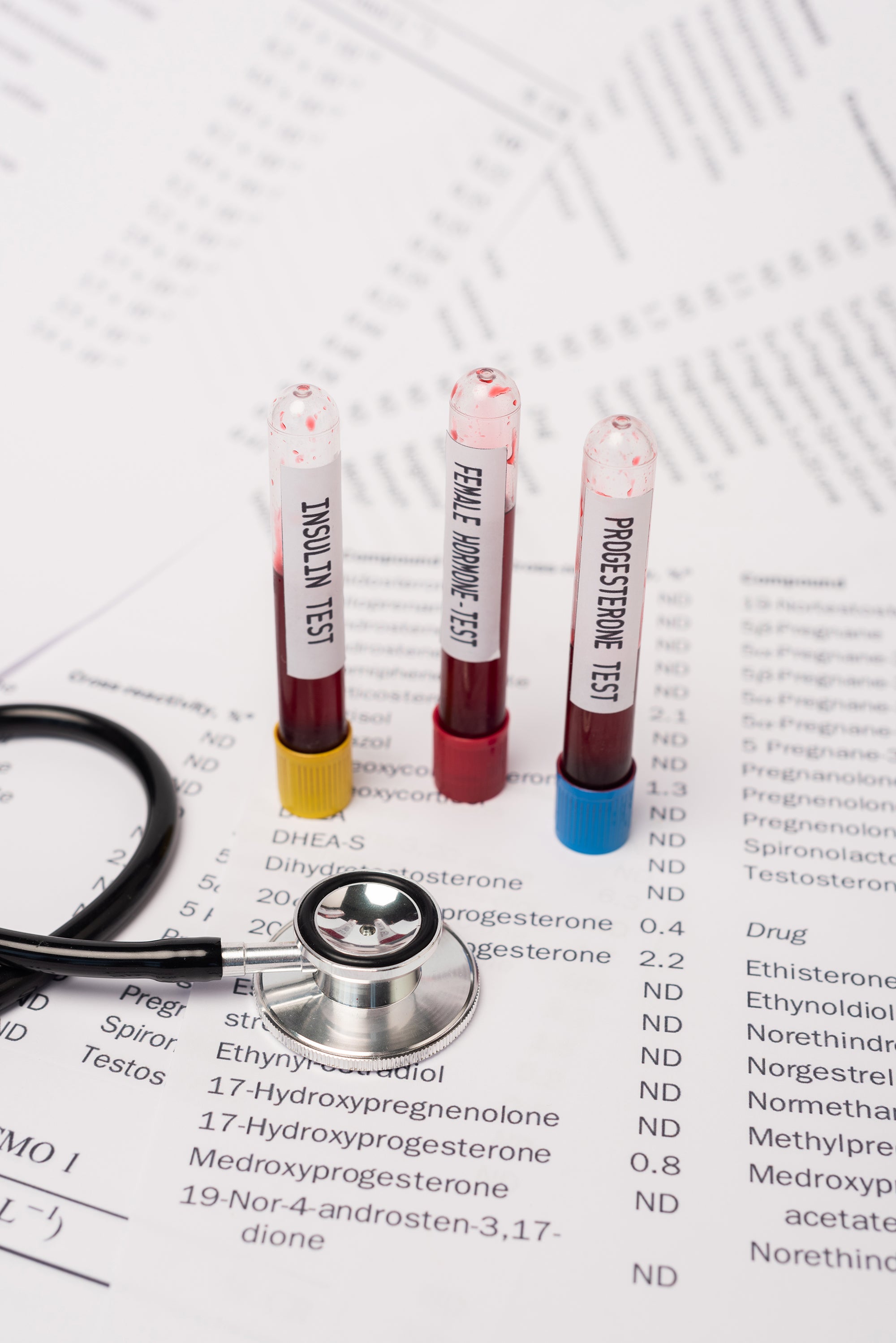Key messages about the inflammation marker in the blood
💡 The CRP value indicates inflammation and infections in the body.
💡 Elevated values may indicate acute or chronic diseases.
💡 A test helps to detect inflammation early and take targeted action.

What is C-reactive protein and what is its significance?
The C-reactive protein (CRP) is a protein molecule that is produced in the liver and enters the bloodstream during inflammatory processes . As a so-called “acute-phase protein” , the CRP level rises quickly when tissue damage or infections occur.
CRP supports the immune system by
activating pro-inflammatory molecules and facilitating the fight against pathogens. Since the CRP level rises just a few hours after the onset of inflammation , it is a particularly sensitive and reliable inflammation marker for acute inflammatory reactions in the body.
We can also recommend the information on the CRP level from netdoktor.de .
Reference range of the CRP value
Unter 5 mg/L: Normaler Bereich
5–10 mg/L: Leichte Entzündung möglich
Über 10 mg/L: Der CRP-Wert ist zu hoch – mögliche akute Entzündung oder Infektion

Causes of elevated CRP levels
If
the inflammation value is elevated, this is not specific to a single disease but indicates an inflammatory reaction in the body. The possible causes are diverse:
- Acute infections: Bacterial infections often lead to significantly elevated inflammation markers. In the case of viral infections, the value also increases, but usually less significantly.
- Chronic inflammations: Diseases such as rheumatism, arthritis or chronic inflammatory bowel diseases (e.g., Crohn's disease or ulcerative colitis) can cause permanently elevated CRP levels.
- Injuries and surgeries: After injuries or surgical procedures, the CRP level rises as the body activates healing and responds to potential infections.
- Autoimmune diseases: In conditions such as Lupus or Multiple Sclerosis, where the immune system attacks the body's own cells, elevated CRP levels can also be detected.
- Cardiovascular diseases: Slightly elevated CRP levels (approx. 1–3 mg/L) can indicate an increased risk for cardiovascular diseases such as heart attack or stroke and are therefore essential for early detection and prevention.
.

CRP: A versatile inflammation marker in diagnostics
The laboratory value CRP is often used in combination with other examinations to obtain a more comprehensive picture of the health condition. An elevated CRP level alone is rarely sufficient
for a diagnosis, but serves as a supplementary marker to locate inflammation in the body or monitor its progression. Especially in chronic diseases or autoimmune diseases , the CRP level helps to correctly classify complaints and symptoms, control the disease progression , and assess the effectiveness of therapies .
CRP and cardiac risk
In cardiology , the so-called hs-CRP test (high-sensitivity CRP test) is used.Even if the CRP level is particularly low, it reliably measures particularly low CRP levels in the range of 0.1 to 3 mg/L, and can detect even slight inflammations. An elevated hs-CRP level can indicate an increased risk for cardiovascular diseases , even if no typical symptoms are present. The hs-CRP test is therefore an important tool to identify individuals who are asymptomatic, but still at risk for atherosclerosis or a heart attack .
Inflammation markers measured – what now? Next steps for your health
The CRP value is an extremely helpful parameter for early detection of inflammation and monitoring its progression. Whether for diagnosing acute infections, monitoring chronic inflammations, or as a risk marker for cardiovascular diseases – the CRP value is versatile.
Regular checks of the CRP value and
a blood count check enable faster detection of health issues and targeted treatment.
Now easily test inflammation markers and gain clarity:
With Probatix, you can check your CRP value easily and reliably from home. Order your CRP test today and keep an eye on your health!
FAQ: Frequently Asked Questions about Stress, Burnout, and Cortisol Levels
CRP value — what is it and why is it important?
CRP value — what is it and why is it important?
The CRP value (C-reactive protein) is an inflammation marker in the body. It indicates whether there is an acute or chronic inflammation and is often used to assess the severity and cause of inflammations.
How is the CRP value measured?
How is the CRP value measured?
The CRP value is determined by a blood test. A simple blood sample is sufficient to measure the CRP value and detect possible inflammatory processes in the body.
What reference ranges are there for the inflammatory marker (CRP value)?
What reference ranges are there for the inflammatory marker (CRP value)?
A normal CRP level is below 5 mg/L. Values between 5 and 10 mg/L indicate a mild inflammation, while values above 10 mg/L may suggest an acute inflammation or infection. A high CRP level is often a sign of a severe inflammation.
What can elevated CRP levels mean?
What can elevated CRP levels mean?
An elevated CRP level indicates an inflammatory reaction in the body. If the CRP level is elevated, it can have several causes. Possible causes include bacterial infections, autoimmune diseases, injuries, or chronic inflammations such as arthritis. Cardiovascular diseases can also be associated with slightly elevated CRP levels.
What symptoms can indicate a high CRP level?
What symptoms can indicate a high CRP level?
Since the CRP value is only a marker for inflammation, it does not indicate any specific symptoms itself. However, symptoms of inflammation can include fever, pain, swelling, fatigue, and redness. A CRP test is often performed to clarify the cause of these symptoms.
What is the difference between CRP and hs-CRP?
What is the difference between CRP and hs-CRP?
The hs-CRP (high-sensitivity CRP) measures very low CRP levels and is often used to assess cardiovascular risk. While the regular CRP test measures acute inflammation, the hs-CRP test indicates subtle inflammation that may be associated with a higher risk of heart disease.
What can I do to lower my inflammation marker (CRP level)?
What can I do to lower my inflammation marker (CRP level)?
A healthy lifestyle can help lower CRP levels. Regular exercise, an anti-inflammatory diet, adequate sleep, and stress management contribute to reducing inflammation. In cases of acute inflammation, treatment with medication may be necessary.
When should the CRP level be checked?
When should the CRP level be checked?
The CRP level should be checked if there is suspicion of an acute or chronic inflammation or if symptoms such as fever, joint pain, or fatigue occur. The hs-CRP level can also be helpful in assessing the risk of cardiovascular diseases.
Can medications affect the CRP level?
Can medications affect the CRP level?
Yes, some medications can affect the inflammatory marker (CRP level). Anti-inflammatory medications, such as corticosteroids or nonsteroidal anti-inflammatory drugs (NSAIDs), can lower the CRP level. Before a CRP test, the doctor should be informed about all medications being taken.
How long does it take for the CRP level to normalize after an inflammation?
How long does it take for the CRP level to normalize after an inflammation?
The CRP level usually decreases within a few days after the cause of the inflammation has been treated. However, in chronic cases, the CRP level may remain elevated for a longer period, and regular monitoring may be necessary.








